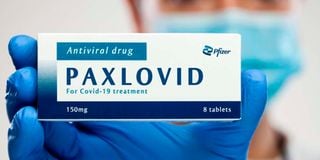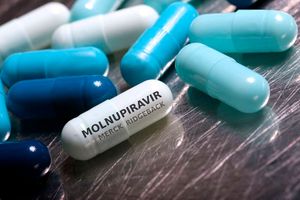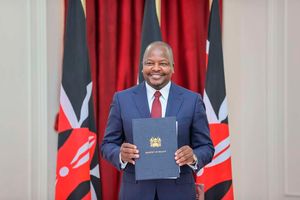Researchers fault Pfizer for non-cooperation on its Covid pill

A drug research group and its partners have called out drug maker Pfizer for failing to cooperate on testing the safety of a new Covid-19 pill in low and middle-income countries like Kenya.
The antiviral drug, whose brand name is Paxlovid, was approved by the United States Food and Drug Administration (FDA) in December last year to treat Covid-19 in people aged 12 and above.
The oral pill is yet to penetrate the African market.
The drug was touted as ‘promising’ as it was found to reduce hospitalisation and deaths by about 90 per cent. This means that in every 10 people with Covid-19, about nine are unlikely to be hospitalised or die from the disease if they take the drug.
But the Drugs for Neglected Diseases Initiative (DNDi) and 26 African and global organisations have reservations, citing Pfizer’s inability to collaborate on studies on the drug in low and middle-income countries as well.
“DNDi and academic investigators from large university hospitals in Europe have separately approached Pfizer about potential collaborations on combination studies in LMICs but Pfizer has declined to provide access to the drug for research purposes,” the group said in a statement.
Last week, the Africa Centres for Disease Control and Prevention (Africa CDC), through its director John Nkengasong, signed a memorandum of understanding with Pfizer to allow Paxlovid pills to be shipped to Africa.
DNDi and its partners say their misgivings are based on an interim ongoing analysis conducted by ANTICOV, a platform used in identifying early treatment of Covid-19 drugs, on the drug.
The analysis was conducted in 10 African countries with about 1,180 patients taking part. It showed that it did not demonstrate satisfactory results five days after use.
“This means that even in a clinical trial setting, more than half of patients would not benefit from Paxlovid,” DNDi said.
“To overcome this challenge, it is necessary to explore whether using Paxlovid with other drugs could widen the ‘treatment window’ to at least 7 days and be beneficial for immune-suppressed patients who are the most vulnerable to disease progression but were excluded from phase 3 trials (and as such, there is no robust evidence available to guide the therapeutic strategies).”
Key public health research questions must be answered hastily, especially those that touch on low and middle-income countries, said DNDi director Dr Nathalie Strub-Wourgraft in a statement.
“It is difficult to understand any rationale for refusing to cooperate in the midst of a global pandemic, and this sets a dangerous precedent since there are many other promising antivirals in the pipeline and these novel treatments will also require follow-on research to determine their optimal use in resource-limited settings,” Dr Strub-Wourgraft said.
DNDi also cited difficulties obtaining the generic version of the drug for other clinical trials.
“Some generic manufacturers are also encountering difficulties obtaining Paxlovid as a ‘reference drug’ so that they can conduct the necessary studies to show regulators that their generic version has the same effect in the body, effectively blocking availability of generics for both research and clinical use.”





